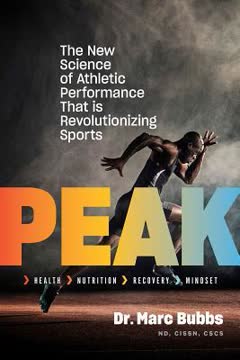Key Takeaways
1. Prioritize Foundational Health for Peak Athletic Performance
In order to unlock your athletic potential, you need to be a healthy person first.
Human First Paradigm. The book emphasizes that optimal athletic performance is built upon a foundation of robust health. Frequent illness, digestive issues, or blood sugar imbalances are incompatible with elite performance. Athletes must prioritize their overall well-being to achieve their full potential and sustain it over the long term.
Health as a Prerequisite. The "Human First" approach highlights that athletes must first be healthy to achieve their performance potential. Athletes who fail to complete 80% of their training sessions due to illness or fatigue will not reach their performance goals. This underscores the importance of addressing underlying health issues to support consistent training and adaptation.
Longevity and Sustainability. Athlete health is crucial for supporting longevity, meaning sustaining elite performance over multiple seasons and throughout a career. Neglecting health in pursuit of short-term gains can lead to burnout, injuries, and a shortened career.
2. Fuel Strategically: Nutrition Tailored to Your Sport
You cannot simply blindly apply strategies to athletes; you must constantly reassess and be nimble enough to change course when needed.
Nutrition Fundamentals. The book stresses the importance of establishing a solid foundation of sound nutrition principles before experimenting with exotic supplements or deep testing. This foundation includes adequate energy availability, proper macronutrient ratios, and sufficient micronutrient intake.
Individualized Nutrition. Elite athletes require individualized nutrition plans that consider their specific sport, training volume, and individual needs. Strategies for physique nutrition, endurance nutrition, and team sport nutrition differ significantly and must be tailored accordingly.
Adaptability and Reassessment. Nutrition strategies should be constantly reassessed and adjusted based on the athlete's response and changing needs. A rigid, one-size-fits-all approach is unlikely to yield optimal results.
3. Master the Art of Recovery: More Than Just Rest
The revolution is a reemphasis on the evidence-based fundamentals as a foundation.
Beyond Passive Rest. Recovery is not simply about taking time off from training. It involves a multifaceted approach that includes nutrition, sleep, stress management, and targeted recovery strategies. "Over-recovery" can be as problematic as a lack of adequate rest.
The Recovery Pyramid. The book introduces a recovery pyramid, prioritizing nutrition, sleep, and stress management as the foundation, followed by training plan adjustments, athlete monitoring, therapeutic treatments, and finally, recovery modalities like ice baths and compression garments.
Athlete Monitoring. Monitoring athletes can be very helpful (or sometimes harmful), the value of subjective data, and the evidence-based periodized recovery strategies to extract the marginal gains athletes need to reach the podium.
4. Supercharge Your Brain: Mental Fortitude Matters
The intersection of where modalities meet is where the next greatest gains will be made.
Brain-Body Connection. The book emphasizes the deep connection between the brain, mood, and physical performance. Nutrition, sleep, and stress management all have a profound impact on cognitive function, emotional intelligence, and mindset.
Emotional Intelligence. Building emotional intelligence, managing stress, and cultivating a resilient mind are crucial for athletic success. The book explores strategies for building self-compassion, overcoming negative self-talk, and developing a positive mindset.
Leadership and Team Culture. The book delves into the mindset of elite leaders, the value of simple heuristics, and the importance of team culture in achieving elite outcomes. It highlights the role of vulnerability, authenticity, and trust in building a cohesive and successful team.
5. Embrace the Expert-Generalist Approach
By taking a certain perspective, you obscure some things and make others highly visible.
Interdisciplinary Thinking. The book advocates for an "expert-generalist" approach, where individuals develop expertise in multiple disciplines to gain a broader understanding of complex problems. This allows for more creative problem-solving and a more holistic approach to athlete development.
Breaking Down Silos. The expert-generalist approach encourages breaking down the barriers between traditionally separate disciplines, such as nutrition, training, and psychology. By understanding the interconnectedness of these areas, practitioners can develop more effective and comprehensive strategies.
Learning Transfer. Learning across multiple fields gives you an information advantage, because most people focus solely on their own field. This multiple-field learning style is referred to as learning transfer, which is when you learn something in one context and then apply it to another.
6. Understand the Athlete Microbiome
You share about 99.5 percent of the same DNA as the person sitting next to you, but only about 10 percent of the same gut microbiota species.
The Microbiome's Role. The gut microbiome plays a critical role in athlete health, influencing metabolism, digestion, immunity, and even mental health. A diverse and balanced microbiome is essential for optimal performance and recovery.
Modern Gut vs. Evolutionary Gut. The book contrasts the modern gut microbiome, often depleted due to processed diets and overuse of antibiotics, with the more diverse microbiome of our ancestors. It explores strategies for "re-wilding" the gut through diet and lifestyle changes.
Athlete Microbiome Signature. Elite athletes may possess a characteristic "microbiome signature" that differentiates them from the general population. This signature is often characterized by a higher diversity of beneficial bacteria and a greater capacity for breaking down complex carbohydrates.
7. Optimize Blood Sugar for Longevity and Performance
The interrelation of disciplines unlocks our true potential.
Blood Sugar's Impact. Maintaining healthy blood sugar levels is crucial for both athletic performance and long-term health. Poor blood sugar control is linked to increased risk of chronic diseases, including diabetes, cardiovascular disease, and dementia.
Beyond the Glycemic Index. The book challenges the traditional focus on the glycemic index, highlighting the importance of individual responses to food. Continuous glucose monitoring (CGM) can provide valuable insights into an athlete's unique blood sugar patterns.
Strategies for Blood Sugar Control. The book explores strategies for optimizing blood sugar control, including time-restricted feeding, plant-based diets, and targeted supplementation. It emphasizes the importance of testing and individualizing approaches.
8. Harness the Power of Sleep and Circadian Rhythms
Sleep should be a nonnegotiable.
Sleep's Impact on Performance. Adequate sleep is essential for athletic performance, affecting speed, endurance, strength, power, injury risk, immunity, attention, and decision-making. Athletes should aim for 8-10 hours of sleep per night.
Circadian Rhythms and Performance. Circadian rhythms play a significant role in athletic performance, with peak performance often occurring in the late afternoon or early evening. Understanding an athlete's chronotype can help optimize training schedules and competition timing.
Overcoming Sleep Roadblocks. The book identifies common roadblocks to optimal sleep, including caffeine, alcohol, blue light, jet lag, and medical conditions. It provides practical solutions for improving sleep quality, duration, and timing.
9. Cultivate Leadership and Team Culture
Culture Is the Strategy.
Beyond Individual Talent. While individual talent is important, team culture and leadership are crucial for sustained success. A strong team culture fosters trust, communication, and a shared commitment to the team's goals.
The Expert-Generalist Leader. Leaders should strive to be "expert-generalists," possessing a broad understanding of various disciplines and the ability to connect with individuals from diverse backgrounds. This allows them to see problems from multiple perspectives and foster collaboration.
Vulnerability and Authenticity. Great leaders are willing to show vulnerability and be authentic, building trust and fostering a sense of connection with their team. They prioritize the needs of the team over their own ego and create an environment where everyone feels valued and supported.
Last updated:
FAQ
What’s [Peak: The New Science of Athletic Performance That Is Revolutionizing Sports] by Marc Bubbs about?
- Comprehensive performance guide: The book explores the latest science behind athletic performance, covering nutrition, training, recovery, sleep, mindset, and leadership.
- Holistic and evidence-based: It integrates insights from multiple disciplines, providing a blueprint for building the fittest, healthiest, and most resilient athletes.
- Target audience: Suitable for recreational and elite athletes, coaches, trainers, and health practitioners seeking actionable, research-backed strategies.
Why should I read [Peak] by Marc Bubbs?
- Unlock athletic potential: The book reveals how elite athletes achieve success by prioritizing health, not just performance, and introduces the “Human First” paradigm.
- Bridges science and practice: It distills decades of research and expert interviews into practical, actionable advice for all levels of athletes.
- Holistic approach: Covers not just training, but also nutrition, sleep, recovery, mindset, and leadership, making it valuable for anyone in high-performance environments.
What are the key takeaways from [Peak] by Marc Bubbs?
- Health is foundational: Sleep, gut health, and blood sugar control are critical for performance and longevity.
- Individualized and periodized nutrition: Fueling strategies must be tailored to the athlete, sport, and training phase.
- Recovery and mindset matter: Both under- and over-recovery can harm performance; emotional intelligence and leadership are vital for sustained success.
What is the “expert-generalist” approach in [Peak] by Marc Bubbs and why is it important?
- Bridging disciplines: The expert-generalist masters knowledge across nutrition, sleep, training, and psychology to see problems holistically.
- Overcoming overspecialization: Integrating diverse knowledge allows for innovative solutions and better athlete support.
- Coach and athlete advantage: Understanding fundamentals beyond one’s specialty helps identify root causes and apply more effective, individualized strategies.
How does [Peak] by Marc Bubbs explain the role of sleep in athletic performance and brain health?
- Sleep is essential: Quality and duration of sleep impact speed, endurance, strength, injury risk, immunity, and cognition.
- Modern challenges: Many athletes get less than 8 hours of sleep due to training, travel, and technology, which impairs recovery and performance.
- Sleep solutions: Prioritize sleep hygiene, create a restful environment, and use tools like the Athlete Sleep Screening Questionnaire to assess and improve sleep health.
What does [Peak] by Marc Bubbs say about the athlete microbiome and its impact on performance?
- Microbiome as a “microbe organ”: The gut microbiome influences metabolism, immunity, inflammation, and energy production.
- Athlete signature: Elite athletes have higher gut diversity and beneficial bacteria, supporting energy, reducing inflammation, and strengthening gut barriers.
- Improving gut health: A diverse diet, prebiotics, fermented foods, probiotics, and stress management help rebuild and maintain a healthy microbiome.
What are the key nutrition strategies for endurance and team sport athletes in [Peak] by Marc Bubbs?
- Carbohydrate fueling: Endurance athletes benefit from 30–60g carbs per hour during exercise; team sport athletes often underconsume carbs, risking low glycogen.
- Periodized nutrition: Strategies like “Train Low, Compete High” and adjusting carb intake based on training and competition are emphasized.
- Hydration and protein: Drinking to thirst and adequate protein intake (1.6–3.1 g/kg/day) are crucial for recovery and performance.
How does [Peak] by Marc Bubbs address blood sugar control and longevity for athletes?
- Blood sugar as a keystone: Poor glucose control is linked to chronic disease and reduced longevity, even in athletes.
- Athlete-specific risks: Intense training and fueling can cause elevated fasting glucose and insulin resistance.
- Control strategies: Time-restricted feeding, polyphenol-rich diets, and continuous glucose monitoring help optimize blood sugar and reduce inflammation.
What is the Recovery Pyramid in [Peak] by Marc Bubbs and how should athletes approach recovery?
- Foundations first: Nutrition, sleep, and mental-emotional health form the base of effective recovery.
- Training and monitoring: Properly planned training and athlete monitoring (using HRV, RPE, and workload ratios) ensure recovery aligns with stress.
- Recovery modalities: Techniques like ice baths and compression are only effective after foundational elements are addressed.
What are the key insights on brain health and concussion management in [Peak] by Marc Bubbs?
- No gold-standard biomarker: Research is ongoing, but no definitive test exists for concussion or dementia progression.
- Prevention and support: Optimal sleep, blood glucose control, and antioxidant-rich nutrition may help mitigate concussion effects.
- Promising supplements: Ketone esters, omega-3s (DHA), creatine, and curcumin show potential, but most evidence is preliminary.
How does [Peak] by Marc Bubbs address mindset, emotional intelligence, and leadership in sports?
- Emotions drive performance: Managing emotions skillfully enhances outcomes; emotional intelligence is key for athletes and coaches.
- Mindfulness and self-compassion: Techniques like positive self-talk, mindfulness, and self-compassion build resilience and focus.
- Leadership lessons: Great leaders combine wisdom, humility, and perspective, fostering team culture, trust, and collective success.
What are the best quotes from [Peak] by Marc Bubbs and what do they mean?
- “For optimal performance, athletes must be fit and healthy.” Emphasizes the need for overall health, not just fitness.
- “It’s not the will to win that matters. It’s the will to prepare to win that matters!” Highlights the importance of preparation in achieving success.
- “Excellence is not an act, it’s a habit.” Consistent habits, not isolated efforts, define high performance.
- “If you’re not sleeping or you’re stressed out at home, you can take all the ice baths in the world, you won’t recover effectively.” Stresses the foundational role of sleep and stress management over recovery modalities.
Review Summary
Readers highly praise Peak for its comprehensive coverage of elite athletic performance. They appreciate the practical applications, scientific backing, and wealth of information on nutrition, recovery, and mental preparation. Many find it valuable for athletes, coaches, and general readers alike. Some note the nutrition sections can be dense, but overall the book is considered accessible and informative. Reviewers particularly highlight its usefulness as a reference guide and its potential to help readers improve their own performance across various aspects of life.
Similar Books
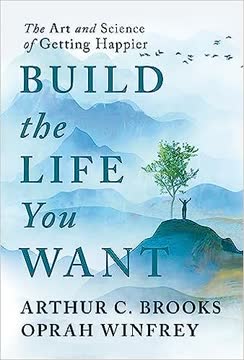
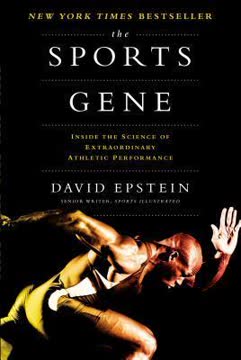

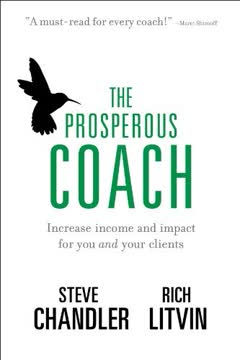
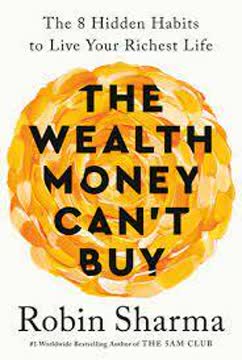
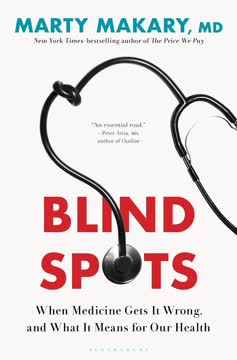
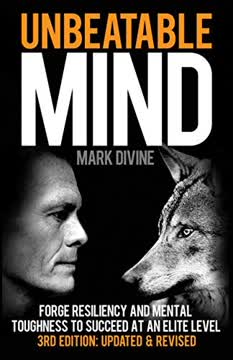
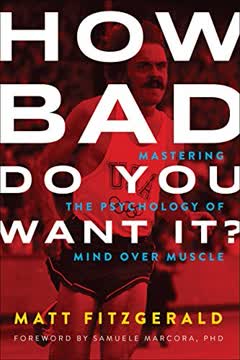
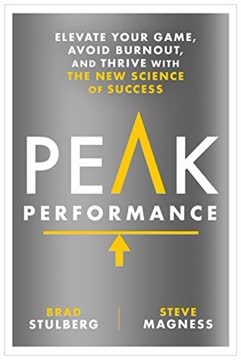

Download PDF
Download EPUB
.epub digital book format is ideal for reading ebooks on phones, tablets, and e-readers.
